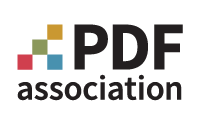
Reporting issues on PDF 2.0-related standards
Excerpt: The PDF Association expands its pdf-issues GitHub repo to cover all ISO standards based on PDF 2.0.
About the author: Peter Wyatt is the PDF Association’s CTO and an independent technology consultant with deep file format and parsing expertise, who is a developer and researcher actively working on PDF technologies … Read more

After a very successful 5 month trial of using GitHub to resolve issues with the latest ISO 32000-2:2020 PDF 2.0 standard, the PDF Association is pleased to announce that henceforth this process will be expanded to cover all PDF 2.0-related published ISO standards, including the following recently published PDF 2.0-based ISO standards:
- PDF 2.0 [ISO 32000-2:2020]
- PDF/A-4 [ISO 19005-4:2020]
- PDF/X-6 [ISO 15930-9:2020]
- PDF/VT-3 [ISO 16612-3:2020]
- ECMAScript for PDF 2.0 [ISO 21757-1:2020]
Issues identified in an ISO PDF subset standard may also identify related issues in the core PDF 2.0 (ISO 32000-2:2020) standard or in another PDF ISO subset standard. For example, based on reported issues in PDF 2.0, the PDF Technical Working Group has already identified additional requirements for the PDF/UA-2 standard currently under development in ISO TC 171 SC 2 WG9. GitHub provides mechanisms to link and track related issues. By using Labels with each GitHub Issue, all issues can be easily filtered.
With close cooperation across all PDF Association technical communities, this process will continue to ensure that the right set of experts is always involved in reviewing each issue, and that the industry-recommended solutions are appropriate for each ISO publication.
From this time forward, if you encounter an issue, from a minor typo or spelling error through to a more significant ambiguity or lack of clarity in any published ISO PDF 2.0-related standard, please create a new issue in the PDF Association’s pdf-issues GitHub repository. All PDF developers should also bookmark and regularly refer to the industry-approved resolutions posted on pdfa.org. These resolutions are written as pseudo-mark-up against the published ISO standards, and are thus easily comprehensible.


